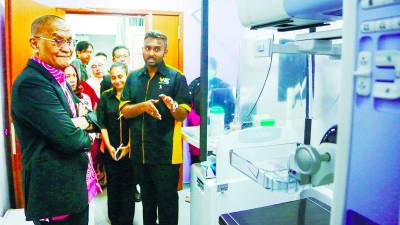PUTRAJAYA: Breast cancer continues to claim lives in Malaysia, with more than half of cases diagnosed at advanced stages, said Health Minister Datuk Seri Dr Dzulkefly Ahmad yesterday.
He revealed that as of 2024, only 857,722 women, just 10.9% of the target population, have undergone breast cancer screenings.
“More concerning is the fact that over 50% of breast cancer cases in Malaysia are detected at stages three and four, indicating late diagnosis,” he said after launching the Breast Cancer Awareness Month ceremony.
Dzulkefly said the Health Ministry is targeting at least 20,000 women aged 30 and above for screenings from October to December through scheduled activities during the awareness month.
“From 2019 to 2023, over eight million women underwent breast cancer screenings, with coverage averaging around 27% annually. The incidence rate in 2022–2023 stood at 38.1 per 100,000 women, underscoring the urgency of stronger awareness and prevention efforts,” he added.
The ministry has outlined several initiatives to boost early detection:
Clinical breast examinations for women aged between 30 and 60 at the Health Ministry’s headquarters, with free mammogram referrals for the B40 group.
Community screenings at 83 locations nationwide, including 20 National Cancer Society Malaysia (NCSM) panel hospitals across 12 states.
Mammogram screening tour using UniSZA’s mobile trailer in collaboration with NCSM at selected sites.
Comprehensive screening programmes covering colorectal, cervical, prostate and
lung cancers.
Dzulkefly highlighted the rising trend in cases, namely 18,206 new cases in 2007–2011, 21,634 in 2012–2016 and 29,534 in 2017–2021.
Between 2022 and 2023, 12,820 cases were reported, with the latest data still being compiled.
“This reflects delays in early detection and underscores the urgent need to strengthen public awareness so that women come forward earlier for screening,” he said, adding that the initiatives aim to expand access, improve early detection and enable timely treatment.
He emphasised the moral and practical responsibility of a national healthcare system, and said: “The strength of a healthcare system is not measured by how well we treat the strongest among us, but by how we protect and care for the weakest and most underserved.
“That is why our outreach programmes are so critical, particularly for low-income and underserved communities.”
In line with the international Pink October campaign, the ministry would organise Breast Cancer Awareness Month under the theme “United for Women: Spread Awareness, Save Lives”, aligned with World Cancer Day 2025–2027’s theme “Unity in Diversity”, highlighting that the fight against breast cancer requires unity and collaboration from all parties.
